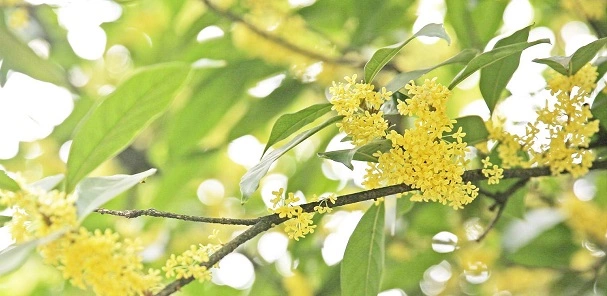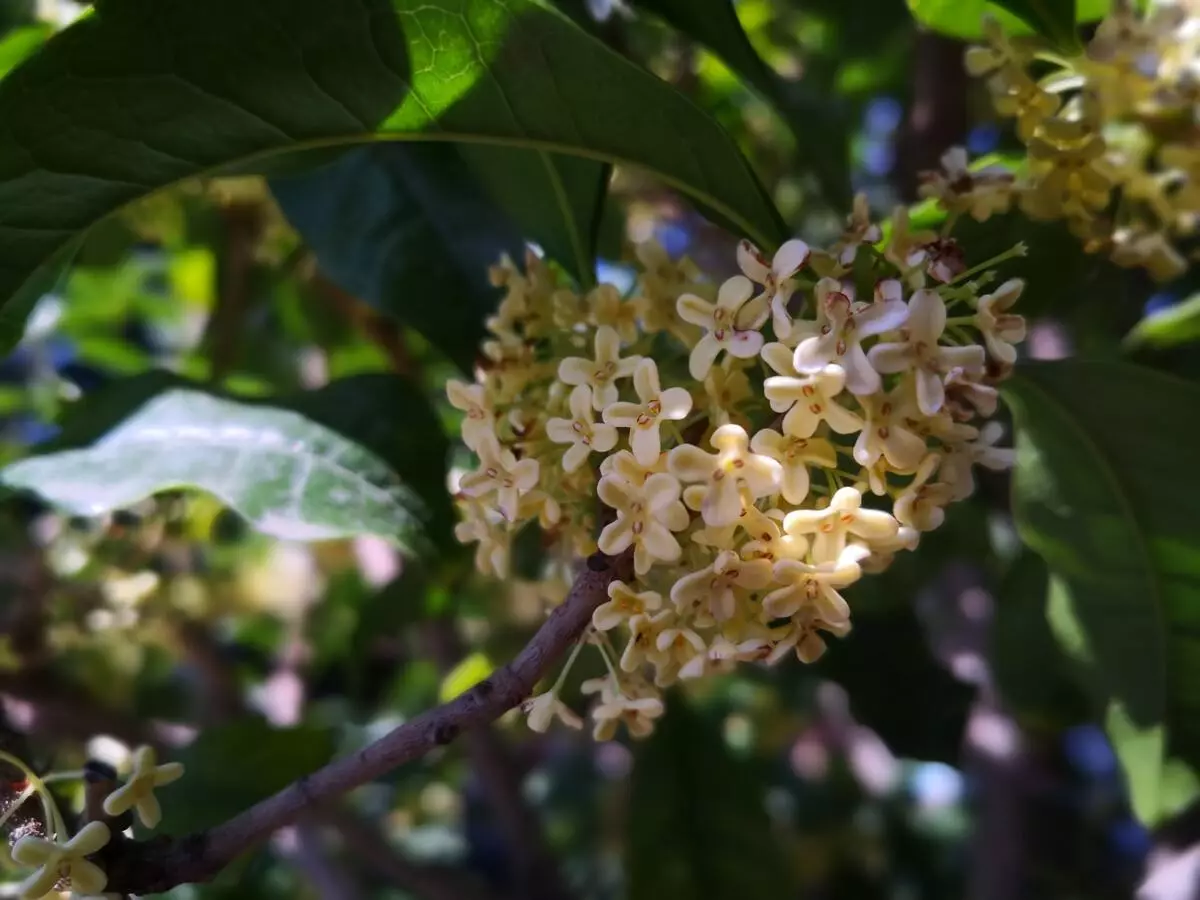How To Fertilize Tea Olive Tree?
Written by Ivy
Nov 19 2022

Tea olive tree has different demand for fertilizer in different seasons and different periods. Fertilization should be carried out according to specific conditions. So, what kind of fertilizer do we need to fertilize tea olive tree? Let's take a look at the fertilization methods and precautions of tea olive tree.
Tea olive tree seedlings absorb nutrients and water all at the fibrous roots around the crown. Therefore, it is appropriate to dig ditches and apply fertilizer at the outer ring of the crown projection, and the ditch depth can be determined according to the depth of the root. The newly transplanted tea olive tree has weak absorption capacity due to root damage, so topdressing should not be too early. When applying fertilizer, the fertilizer shall not be in direct contact with branches and leaves, coarse roots and fibrous roots. After construction, it is required to cover the soil and level the ground at the same time.
Fertilization is very important for the growth and development of tea olive tree In order to make tea olive tree flourish and grow vigorously, it should be fertilized. Fertilization should be thin and frequent, mainly quick acting nitrogen fertilizer. Young tea olive tree should be fertilized four times a year, before winter, before germination in early spring, in late May and from the end of June to the end of July. It should be carried out when the weather is sunny and the soil is dry.
For the first two times, cattle and sheep manure and lake mud combined with salofalk microbial fertilizer were mainly used as base fertilizer, and for the last two times, quick acting nitrogen fertilizer was mainly used. Adult tea olive tree is fertilized three times a year. One base fertilizer shall be applied from the middle and late October to before winter; Two times of forced fertilization, the first is to promote shoot fertilizer, which is applied from February to march to promote spring shoot; The second time is to apply fertilizer to promote flowers in August (one month before flowering) to increase the amount of flowers and improve the quality of flowers.
(2) In July, an appropriate amount of available phosphorus and potassium fertilizer can be applied to each plant to improve the drought resistance of tea olive tree and make it flourish;
(3) In October, an appropriate amount of organic fertilizer can be applied to each plant to improve its cold resistance and prepare tea olive tree for overwintering.
(2) Fertilization at the middle and small seedling stage. Tea olive tree is a fragrant flower and tree. It likes fertilizer containing phosphorus and potassium. Therefore, during the whole growth period, fertilizer with more phosphorus and potassium should be applied appropriately, and the fertilizer must be applied where the root system can absorb it. The root system of seedlings is concentrated and transplanting is easy to survive. Therefore, the fertilization in the nursery cannot be too far from the seedling crown, otherwise, the root system will expand outward. However, it should not be applied under the trunk, which is not conducive to the absorption of fertilizer and the fertilization of tea olive tree.
(3) Medium and large seedlings can be fertilized three or four times a year. In early spring, organic fertilizer was applied in the tree tray to promote the growth of spring shoots. After tea olive tree blooms in autumn, in order to restore tree vigor and supplement nutrition, inorganic fertilizer or garbage fertilizer shall be applied in the early stage of winter. During this period, fertilizer can be applied once or twice according to the growth of tea olive tree.
Fertilization Time of Tea Olive TreeSelect Tea Olive FertilizerPrecautions for FertilizationTea Olive Tree Fertilizer CompositionFertilization Methods of Tea Olive Tree in Different SeasonsDifferent Fertilization Methods According to Tea Olive Plant SizeFrequently Asked Questions About Tea Olive Tree
Fertilization Time of Tea Olive Tree
Tea olive tree is a plant that needs to provide it with a lot of nutrients for conservation. How to fertilize tea olive tree? tea olive tree can be fertilized every 10 days in spring, every half a month in autumn and in winter. Tea olive tree does not need to be fertilized at other times.Select Tea Olive Fertilizer
Tea olive tree generally mainly needs nitrogen fertilizer, followed by phosphorus fertilizer and potassium fertilizer. Generally, nitrogen fertilizer is best applied in spring, phosphorus and potassium fertilizer can be applied in autumn, and rotten organic fertilizer can be applied once in winter, which can help tea olive tree survive the winter and promote tea olive tree to grow more vigorously.Precautions for Fertilization
Each time we fertilize tea olive tree, we should not be too thick. It is best to fertilize in the morning and evening, otherwise the temperature is too high, it is easy to burn roots, which will affect the normal growth of tea olive tree. The fertilizer applied to tea olive tree needs to be decomposed, otherwise the fertilizer will ferment in the basin soil and produce a large number of bacteria, so that the roots cannot grow normally in the soil.Tea olive tree seedlings absorb nutrients and water all at the fibrous roots around the crown. Therefore, it is appropriate to dig ditches and apply fertilizer at the outer ring of the crown projection, and the ditch depth can be determined according to the depth of the root. The newly transplanted tea olive tree has weak absorption capacity due to root damage, so topdressing should not be too early. When applying fertilizer, the fertilizer shall not be in direct contact with branches and leaves, coarse roots and fibrous roots. After construction, it is required to cover the soil and level the ground at the same time.
Fertilization is very important for the growth and development of tea olive tree In order to make tea olive tree flourish and grow vigorously, it should be fertilized. Fertilization should be thin and frequent, mainly quick acting nitrogen fertilizer. Young tea olive tree should be fertilized four times a year, before winter, before germination in early spring, in late May and from the end of June to the end of July. It should be carried out when the weather is sunny and the soil is dry.
For the first two times, cattle and sheep manure and lake mud combined with salofalk microbial fertilizer were mainly used as base fertilizer, and for the last two times, quick acting nitrogen fertilizer was mainly used. Adult tea olive tree is fertilized three times a year. One base fertilizer shall be applied from the middle and late October to before winter; Two times of forced fertilization, the first is to promote shoot fertilizer, which is applied from February to march to promote spring shoot; The second time is to apply fertilizer to promote flowers in August (one month before flowering) to increase the amount of flowers and improve the quality of flowers.

Tea Olive Tree Fertilizer Composition
The most important fertilizer elements of tea olive tree are mainly nitrogen, phosphorus and potassium, which can be directly used as quick acting fertilizer. However, other elements should be drained from the soil and compensated by applying organic fertilizer. Reasonable fertilization directly affects the growth and development of tea olive tree.Fertilization Methods of Tea Olive Tree in Different Seasons
(1) In late March, an appropriate amount of nitrogen fertilizer can be applied to each tea olive tree to promote its height and multiple tender shoots;(2) In July, an appropriate amount of available phosphorus and potassium fertilizer can be applied to each plant to improve the drought resistance of tea olive tree and make it flourish;
(3) In October, an appropriate amount of organic fertilizer can be applied to each plant to improve its cold resistance and prepare tea olive tree for overwintering.
Different Fertilization Methods According to Tea Olive Plant Size
(1) The newly transplanted tea olive tree has weak absorption capacity due to root damage, so topdressing should not be too early. The base fertilizer of the transplanted pit should be mixed with the soil and then covered with soil. The root system should not be in direct contact with the fertilizer to avoid damaging the root and affecting the survival rate.(2) Fertilization at the middle and small seedling stage. Tea olive tree is a fragrant flower and tree. It likes fertilizer containing phosphorus and potassium. Therefore, during the whole growth period, fertilizer with more phosphorus and potassium should be applied appropriately, and the fertilizer must be applied where the root system can absorb it. The root system of seedlings is concentrated and transplanting is easy to survive. Therefore, the fertilization in the nursery cannot be too far from the seedling crown, otherwise, the root system will expand outward. However, it should not be applied under the trunk, which is not conducive to the absorption of fertilizer and the fertilization of tea olive tree.
(3) Medium and large seedlings can be fertilized three or four times a year. In early spring, organic fertilizer was applied in the tree tray to promote the growth of spring shoots. After tea olive tree blooms in autumn, in order to restore tree vigor and supplement nutrition, inorganic fertilizer or garbage fertilizer shall be applied in the early stage of winter. During this period, fertilizer can be applied once or twice according to the growth of tea olive tree.
Frequently Asked Questions About Tea Olive Tree
Latest Updated
- Benefits of Bugleweed - 7 Science-backed Health Benefits
- Bugleweed Dangers & Side Effects - Is It Poisonous?
- How to Plant Evergreen Trees - What You Should Know
- When to Plant Evergreens - Grow Guide for Evergreen Trees
- 12 Wonderful Evergreen Shrubs for Your Garden
- 12 Popular Evergreen Plants with Pictures for Beginners
- When And How To Prune A Lilac Bush Like a Pro
- How to Grow & Care for Lilac Vine (Hardenbergia Violacea)
- Japanese Lilac Tree (Syringa Reticulata) Care & Propagation Guide
- Shumard Oak Pros and Cons - What to Know
Popular Articles
- Winter maintenance of Antirrhinum Majus
- How to Grow Terminalia Mantaly Tree
- How to Grow and Care for Crossostephium Chinense
- How to grow Antirrhinum Majus in spring
- Peristeria Elata (Dove Orchid) Profile: Info & Care Guide
- Underwatered Snake Plant (Sansevieria Trifasciata) - Signs And How To Fix
- How to Care for Brazilian Jasmine Plant (Mandevilla Sanderi)
- How to Grow & Care for Graptopetalum Purple Delight in Summer
- Rosa Chinensis (China Rose): Plant Growing & Care Tips
- How to Care for Baby Sun Rose (Aptenia Cordifolia)